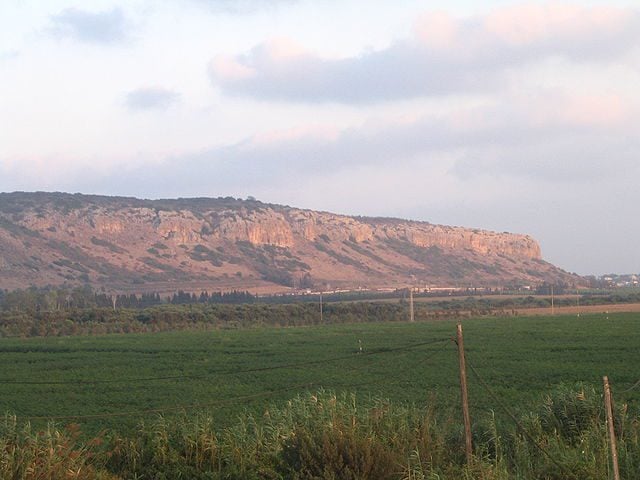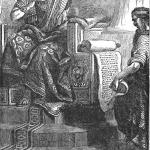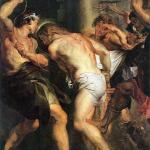
(4-9-06)
***
I’d like to deal with a proposed dilemma. A Lutheran professor of history with whom I was debating, stated: “Samuel, Elijah, young Solomon, etc.) did precisely what Hezekiah and Josiah felt commanded by the word of God to reject.” This was a fascinating line of inquiry. Were the righteous prophets Samuel and Elijah actually on the wrong side of the issue and on the side of a corrupt tradition later corrected by good Torah-alone proto-Protestants Josiah and Hezekiah? As we’ll see, it’s not nearly as simple as might be supposed.
The issue of “high places” is not utterly black-and-white, as if they are all evil, period. Granted, most or many apparently were, since they were either idolatrous, sometimes even child-sacrificing, or relatively innocuous but contrary to Mosaic Law. Hence, The International Standard Bible Encyclopedia (ISBE):
[T]he service might be anything from the orderly worship of Jeh under so thoroughly an accredited leader as Samuel (1 Sam. 9:11-24) to the wildest orgiastic rites. (“High Place,” Vol. III, 1391)
Does the Bible unilaterally condemn all such worship at high places, including Samuel’s? No (quite interestingly to me), according to ISBE:
In 1 Samuel, sacrifice outside of Jerusalem is treated as an entirely normal thing, and Samuel presides in one such case (1 Sam. 9:11-24). In 1 Kings the practice of using high places is treated as legitimate before the construction of the Temple (1 Kings 3:2-4), but after that it is condemned unequivocally . . . the editor of Kings has about the point of view of Dt. 12:8-11, according to which sacrifice was not to be restricted to Jerusalem until the country should be at peace, but afterward, the restriction should be absolute. (Ibid., 1391)
So we see that in addition to rank idolatry, human sacrifice, or licentious rites, another factor to take into consideration is whether worship of Yahweh at a high place (Samuel) occurred before the building of the Temple. 1 Kings 3:2-4 is fascinating. First in 3:2 it says that “the people were sacrificing at the high places, however, because no house had yet been built for the name of the LORD.” This seems neutral on the question (some think it is even apologetic). Yet in v. 3 we are told that “Solomon loved the LORD, walking in the statutes of David his father; only, he sacrificed and burnt incense at the high places.” Only is also used in KJV and NRSV, while NIV and NASB have except and NEB has but he too. This is clear disapproval in some sense.
Yet after Solomon offered a thousand burnt offerings at Gibeon, God appears to him (with no hint of disapproval) and this is where Solomon is granted his gift of wisdom (1 Kings 3:4-14). 2 Chronicles 1:1-13, the parallel passage, adds the important fact that the Tabernacle (“tent of meeting” / “tabernacle of the LORD”: 1:3,5) was there, as was the brazen, bronze altar (1:5). Thus it seems to have been a perfectly legitimate, permissible religious rite.
The Eerdmans Bible Commentary for the passage provides yet more food for thought:
[W]e must recognize that the LORD always dealt with His people in the situation in which they were at the time, seeking to lead them onto something better. God was willing to meet the king in the great high place at Gibeon (v. 5), even though in another few generations the high places would become abominable; but then so would the sacrificial acts performed in accordance with the letter of the law of Moses but in violation of its spirit. 4 According to 2 Ch. 1:1-13 the sacrifice at Gibeon was an inaugural religious ceremony in lieu of the coronation (cf. 1 Ki. 1:39; 1 Ch. 29:22). Zadok was apparently priest of Gibeon (1 Ch. 16:39) and there may have been an Aaronite priesthood there from the time of Joshua (Josh. 9). This would explain why the Tabernacle and the brazen altar (2 Ch. 1:3,5) were brought there, probably from Shiloh. Keil [considered one of the greatest OT commentators] says the high places were consecrated to the worship of Yahweh and were essentially different from the high places of the Canaanites, which were consecrated to Baal, but this would be difficult to prove. (p. 326)
ISBE adds about Gibeon: “. . . the editor of Chronicles . . . explains the sacrifice at Gibeon as justified by the presence of the Tabernacle (1 Ch. 16:39; 21:29; 2 Ch. 1:3,13) . . .”
1 Chronicles 16:39-40 tells us about Zadok and other priests offering sacrifice at Gibeon in the tabernacle, “according to all that is written in the law of the LORD which he commanded Israel” — with David’s express sanction. Since Tabernacle worship was mobile by nature, then one cannot say it was wrong at Gibeon anymore than they could say it was wrong anywhere in the Sinai desert when Moses was alive.
1 Chronicles 21:18-30 provides the account of David being commanded by “the angel of the LORD” (via Gad) to “rear an altar to the LORD on the threshing floor of Ornan the Jebusite” (21:18-19). This was God commanding (21:19), so it is not even speculative. David then presented burnt offerings and God answered with fire from heaven (21:26). This could hardly be condemned, then, since God approved. And we know that the Tabernacle was, at that same time, at Gibeon (21:29). Non-Tabernacle sacrifice before the Temple is not distinguishable from non-Temple sacrifice after the Temple. But God allowed it, because (I would say) He was greater than the Law (as in some teachings of Jesus, Who said that David once ate the bread that only priests were to eat).
But when Josiah deposed the priests it is specifically noted that they were “idolatrous” (2 Kings 23:5). Josiah dealt with wicked scandals like male prostitution (23:7) and child sacrifice to Molech (23:10). That was both after the Temple was built, and after a considerable period of corruption. King David is also included in the same mix. If he was wrong, then so was God, since He both commanded David to do it and sent fire down to consume the sacrifice. It is said that Josiah defiled a high place that the older Solomon had built for Ashtoreth, etc. (23:13), but that is entirely different from the true, legitimate worship of the young Solomon at Gibeon. This was when he later went astray (see 1 Kings 11:4-10, 33).
ISBE opines that “Amos and Hosea . . . have only denunciation for the sacrificial practices of the Northern Kingdom. That, however, these sacrifices were offered in the wrong place is not said” (emphasis in original). And concerning Jeremiah and Ezekiel, “idolatry or abominable practices are in point.” Isaiah only makes one brief mention of Hezekiah’s reform (36:7). (Ibid., 1391).
The New Bible Dictionary confirms all this, too, in its article “High Place”:
With the building of the Temple, the rebellion of Jeroboam, and the increase of idolatry, the word bama [high place] acquires a new and evil meaning . . .
. . . in the record of King Asa, we are told that he did “right in the eyes of the Lord”, and his zeal to remove all traces of idolatry is recorded; then come the words “the high places were not removed” (1 Kings 15:11-14); and these are repeated in the case of other good kings, zealous for Yahweh. The tone here is the same as that in 1 Ki. 3:2, and we are led to think of these high places as being like Gibeon, and perhaps like that of Samuel at Ramah. Worship in these and similar places was offered still to Yahweh; it had become irregular now that the Temple had become the true centre. (pp. 525-26)
The Eerdmans Bible Dictionary adds, after referring to Hezekiah and Josiah:
More often, however, references are made to kings who “walked in the way of the Lord” without removing these installations (1 Kgs. 22:43; 2 Kgs. 12:3; 14:4; 15:4,35; 2 Chr. 15:17; 20:33). (“High Place,” 487)
As for Samuel, the details of his use of the high place (1 Samuel 9-10) is matter-of-factly presented without any trace of disapproval from God or the writer (1 Sam. 9:12-14). Right after this is an account of God telling Samuel that he is to anoint Saul king of Israel (9:15-17). Wouldn’t it be a bit odd if Samuel was committing this terrible sin of sacrificing wrongly, that God would not condemn him while he was telling him about Saul (just as in the case of God giving Solomon wisdom, right at Gibeon when he is sacrificing)? But instead, nothing, because Samuel had done nothing wrong whatsoever.
After Saul was anointed, a band of musical prophets met him, “coming down from the high place” and “prophesying” (10:5, 10), at which time “the spirit of God came mightily upon him, and he prophesied among them” (10:10). Then, “when he had finished prophesying, he came to the high place” (10:13). So we have true prophets going to the high place, then the Holy Spirit came upon Samuel and he prophesied (a supernatural gift), and then he goes up there, too, and all this happens without the slightest condemnation noted in the text.
We can’t appeal to Elijah as supposedly opposed to Josiah and the Bible; we can’t seriously argue that Elijah was wrong to sacrifice on Mt. Carmel. ISBE states that “Elijah felt the destruction of the many altars of God as a terrible grief (1 Kings 19:10, 14)” (Ibid., 1391). Nothing in the Bible text indicates that he had done any wrong. But the Bible tells us that Elijah, following all of God’s law (1 Ki. 18:18, 36), made an altar on Mt. Carmel (18:30-35) and prayed that God would reveal Himself (18:36-37). God did so by sending fire for the offering on the altar (18:38). So if Elijah was wrong, God was wrong, and would have participated in a worship ritual that you claim is contrary to the word of God and Josiah. There is no conflict. Josiah fought against idolaters or worse. Elijah, Samuel and young Solomon were not included in that crowd.
In 1 Kings 18:46 we learn that “the hand of the LORD was on Elijah” (while he was sitting on top of Mt. Carmel again: 18:42). When he prays to God, mentioning that “the people of Israel have forsaken thy covenant, thrown down thy altars, and slain thy prophets” (19:10; repeated in 19:14), God doesn’t correct him and say that he was the one who had forsaken the covenant by sacrificing at an idolatrous high place contrary to the Law, or that Israel was right to knock down the altar, and he wrong to build it up, or that he was a false prophet because of those two things. Why not?
It’s idolatry that is always condemned as wrong, in both testaments.
***
Photo credit: Mt. Carmel in Israel; photograph by Chadner (2008). This was a “high place” (1791 feet high) that had a permissible altar: the one built by the prophet Elijah. I visited the site in 2014. [public domain / Wikimedia Commons]
***













